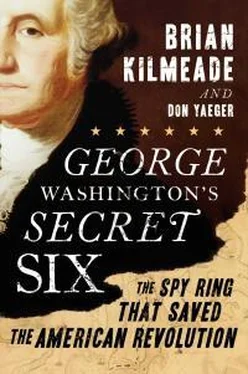Washington felt keenly the responsibility for Hale’s safety, having had the final say on whether or not the mission would go forward. There was no way of knowing how the young man was coping, and this concerned Washington even more. Where was he staying? With whom was he speaking? Had he stumbled into any situations that might put him in harm’s way—more so than the mission itself, that is? Every time he heard the rapid hooves of a post-rider’s horse, he had to fight the urge to run out and seize the letters from the courier’s hands. Just as much as he craved the information Hale would be sending, Washington wanted the assurance that the young lieutenant still maintained his cover and felt confident in his ability to quietly exit Long Island when the right moment came.
Long Island was enemy territory. Its farmland crawled with soldiers determined to hold on to their slice of land and eager to arrest anyone who might threaten their prospects of gaining more. Because the British were so firmly entrenched in their prize real estate, it was a perfect holding pen for the British army awaiting the next offensive strike, and the troops poured in. By the time Hale landed, the island was full of redcoats armed and itching for a fight with anyone who had even a whiff of Patriot sentiments about him.
But just as potentially damning to Hale’s mission was the civilian population. While a few Patriots suffered through the occupation, the sympathies of most Long Islanders lay with King George. Even if a farmer was a Patriot, with a British military officer taking quarter in his house he was very likely to shout “God save the king!” if it kept his children safe and his fields unscathed. For this reason alone, Washington worried that a seemingly trustworthy contact might be tempted to report a suspected spy, whether out of true loyalty to the Crown or in the hopes of procuring some additional protection for his own family and property.
Any number of innocent situations could blow Hale’s cover to a suspicious local: an ignorance of the proximity of one town to the next, the mispronunciation of a word peculiar to that region, a slip of the tongue that betrayed him as a mainlander. The flimsy nature of Hale’s cover story might easily be blown as well—what school would be looking for a teacher this far into September? Perhaps he might be spotted by an old friend and hailed with a familiarity that would be impossible to deny. A Loyalist relative might do the same thing, but with less innocent intentions. Or maybe even Hale’s own Patriotic zeal would do him in, were he unable to remain silent in the face of insults to his cause or so trusting that he shared his true feelings with someone masquerading as a sympathetic ear.
A week passed with no disaster, and Washington breathed a sigh of relief. While the danger was still intense, he hoped Hale had established a solid cover and was out of direct suspicion. Unfortunately, his relief was premature.
FAILURE
On September 21, Washington spent most of the day studying maps and potential battle plans and, in the evening, writing a few letters. He had no way of knowing that at the tip of the peninsula, Nathan Hale was, at that very moment, being arrested, charged with spying, and sentenced to “be hanged by the neck until dead” the following morning.
As if to highlight Hale’s lonely experience on Long Island, no one can say with certainty exactly where he was detected and captured, or even what activities he was engaged in before that fateful event. Somehow he made his way westward to Brooklyn, then crossed over into lower Manhattan, though no records show exactly when or how. Perhaps he only made that crossing later, as a prisoner. By some reports, he was recognized by some Loyalist cousins and reported to the British; by other reports, he mistook a British boat as the ferry sent to return him to safety; by still others, he was lulled into a false sense of security and shared the details of his plans with some Loyalist locals at a tavern and they turned him in. Whatever the case, he was captured, tried, and hanged all in the span of roughly twelve hours.
Shortly after Hale’s body ceased to swing like a pendulum in the Park of Artillery, Captain John Montresor of His Majesty’s army set out for the American camp under a flag of truce. He was granted an audience with a young Patriot captain and aide to General Washington named Alexander Hamilton to explain the purpose of his visit and inform the Americans of the execution of Lieutenant Hale. The visit was not only a formal courtesy but also a thinly veiled warning that their sad little attempt at espionage had been an embarrassing failure.
The news cut Washington deeply. Casualties were an unavoidable part of the ugly business of war, but had the general not known the futility of the effort even before sending Hale on his mission? Had he not immediately detected a dozen problems with the plan? Did he not sense, deep down, that it had been doomed from the start when one brave but untried young man had taken all of the responsibility upon himself? Hale’s death was a tragedy for its own sake, for the fact that Washington now had no agent to feed him the information he desperately needed from Long Island, and because of how unnecessary it was. Had there only been a more knowledgeable, less conspicuous ring in place whose members could not only gather the necessary information but also protect one another even as they operated in anonymity, things might have gone very differently.
Hale’s attempt to gather and convey information had been an utter failure, but he had given his beloved general something just as valuable: the recognition that Washington needed more than just one brave man on Long Island; he needed an entire network.
A TURN AT TRENTON
As the autumn of 1776 progressed to winter, General George Washington found himself marching from New York to New Jersey to Pennsylvania in a series of disheartening campaigns. His troops were demoralized and the civilian population even more so, as many who were formerly enthusiastic supporters of the Patriotic cause took oaths of fidelity to the king or else simply quietly withdrew their support for liberty. In October, Washington met up with reinforcements, but found their number a mere half of the five thousand troops he had anticipated. Supplies were low and he could no longer count on the local populace to show their support by selling food and other necessary supplies to the Continental Army. The British troops, on the other hand, were well supplied and their numbers bolstered by the Hessians, German mercenaries with a reputation for being boulders of men and unflappable in battle.
Just before the celebration of Christmas, Washington was eyeing a return to New Jersey. He had to regain control of the mid-Atlantic after the disappointing autumn or lose the war, so he began to formulate a plan to attack the Hessian encampment at Trenton—a daring raid requiring yet another treacherous ferrying of men and supplies across water. Braving large masses of ice and winter winds that could easily overturn the small boats, his men would cross the river and capture the city in an attempt to break a stronghold of British control in the region.
“We are in a very disaffected part of the Provence,” Washington wrote to his brothers John and Samuel in two telling and very nearly verbatim letters. Samuel’s version, dated December 18, 1776, reads:
And between you and me, I think our Affairs are in a very bad situation; not so much from the apprehension of Genl. Howe’s Army, as from the defection of New York, Jerseys, and Pennsylvania. In short, the Conduct of the Jerseys has been most Infamous. Instead of turning out to defend their Country and affording aid to our Army, they are making their submissions as fast as they can. If the Jerseys had given us any support, we might have made a stand at Hackensack and after that at Brunswick, but the few Militia that were in Arms, disbanded themselves or slunk off in such a manner upon the appearance of danger as to leave us quite unsupported and to make the best shifts we could without them and left the poor remains of our Army to make the best we could of it.
Читать дальше












